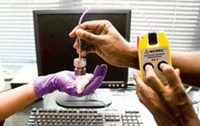IISc develops novel drug delivery device
08 May 2013
Scientists at the Indian Institute of Science (IISc), Bengaluru, has designed a pen-shaped, needle-less drug delivery device that uses supersonic shock waves for the painless delivery of medicines into the body.
 This new method has been developed through collaborative work between the institute's laboratory for hypersonic and shock waves of the department of aerospace engineering, and the microbiology and cell biology department, minister of state for human resource development Shashi Tharoor informed the Lok Sabha in a written reply today.
This new method has been developed through collaborative work between the institute's laboratory for hypersonic and shock waves of the department of aerospace engineering, and the microbiology and cell biology department, minister of state for human resource development Shashi Tharoor informed the Lok Sabha in a written reply today.
He said the new technique has been successfully used to deliver typhoid vaccines into mice in the laboratory. The depth of penetration of drug below the skin has been found to be very small and the animals during vaccine delivery do not experience any great deal of pain.
The animal trials have also shown that through this method a lesser quantity of vaccines could be successfully used to provide resistance to animals against infection compared to conventional methods.
The new system has multiple advantages such as being painless, easily portable, completely disposable, safe and very economical, the minister added.
The device, which may cost around Rs9,000, is expected to be in the market in two-and-a-half years, after human trials are completed, according to researchers at the department of microbiology and cell biology at IISc.
Companies and researchers across the world are working on needleless drug delivery systems, including nasal inhalers and skin patches, which will provide a painless, economical and more effective way of administering drugs.
As per estimates of the World Health Organisation (WHO), around 12 billion injections are used globally.
The market value of transdermal delivery, or injecting drugs through the skin, is estimated to increase to $31.5 billion in 2015 from $21.5 billion last year, according to market research firm Research and Markets.
The device has applications in the medical world such as effective insulin intake and cancer cell treatment, among others.
So far, oral insulin has not really been a success and there have
been no improvements on a ''jet injector'' attempt made in Italy and America decades ago.
IISc is the only organisation that has developed a non-invasive, needleless drug delivery device in the world using a supersonic shockwave technology, according to Gopalan Jagadeesh, a faculty member at the institute's department of aerospace engineering.
US-based Bioject Medical Technologies Inc is also said to be making such a device, but using a different gas-based technology to create energy dissipation, he said. Yet another US-based firm, Bio-Rad Laboratories Inc has developed a so-called gene gun, he added.
Each year, unsafe injections cause an estimated 1.3 million premature deaths, the loss of 26 million years of life, and an
annual burden of $535 million in direct medical expenses, according to WHO estimates. In four out of six parts of the
world, more than 30 per cent of immunisation injections are unsafe, it said. In poorer nations, the possibility of HIV transmission through contaminated injections is also very high.
The IISc was conceived as a ´research institute´ or ´university of research´ by its founder Jamsetji Nusserwanji Tata, in the final years of the 19th century. It is also the earliest example of a fruitful public-private partnership.
The institute engages in interactions with society and industry through a variety of outreach programmes and its areas of research range from biochemistry to aerospace engineering.
The institute has spawned several centers of learning like the Tata Institute of Fundamental Research (TIFR) and the Indian Space Research Organisation (ISRO).
The first Indian Institute of Technology (IIT) at Kharagpur was also established by JC Ghosh, who was the director of IISc between 1939 and 1948.


















